

CHRISTIAN LEADER

Supporting the single parent
Global mission shifts Nevada congregation joins USMB






Aquote from entrepreneur Roger Ward Babson comes to mind as I pay household bills each month: “More people should learn to tell their dollars where to go instead of asking them where they went.” Since he was a millionaire philanthropist, Babson’s advice is worth following, to my way of thinking.
I also respect Babson’s recommendation because of the unique way in which he practiced what he preached. I’m thinking of the Babson Word Rocks, an intriguing hiking and mountain-biking trail in Gloucester, Mass. Babson created a series of immense boulders etched with sayings to promote his inspirational ideals. He hired local stonecutters to carry out the task as a Works Progress Administration project during the Great Depression.
Originally the boulders stood in a groomed field, but today it can be difficult to find some of the 24 boulders in what is now an overgrown forest. But once discovered, their inscriptions—and their plain but sensible messages—are still unmistakably visible: “Use your head,” “Stay out of debt,” “Be on time,” and “Never try, never win."
More people should learn to tell their dollars where to go instead of asking them where they went.
In his autobiography, Babson admits that his family thought he was crazy: “My family says that I am defacing the boulders and disgracing the family with these inscriptions, but the work gives me a lot of satisfaction, fresh air, exercise and sunshine. I am really trying to write a simple book with words carved in stone instead of printed paper.”
This brings me back to Babson’s admonishment that we send our dollars on intentional journeys. One cause I invite you to support is U.S. Mennonite Brethren church planting efforts. Last year, USMB announced its intention to partner with district conferences to plant six new Mennonite Brethren churches in the United States every year for the next 10 years. This goal was accomplished in 2012 and as of June—the halfway point of the current calendar year—we’re midway to our 2013 goal in terms of new church plants.
We are not, however, meeting the related goal of funding six new church plants in 2013. If U.S. Mennonite Brethren congregations would forward 2 1/2 percent of their budget to USMB as requested, funding for church plants—and all national programs—would not be an issue. While Babson wrote on rocks, we want to see God’s transforming love written on the hearts and in the lives of men, women and children who do not yet know him as Lord and Savior. So I challenge each USMB congregation and household to “tell” your dollars to support USMB church planting ventures.

Connie Faber Editor
















Gaylord Goertzen

One way to water flowers and plants during the summer is with a spray wand. A spray wand has a long handle that allows you to choose what plants to water and how much water each plant receives. It also has a trigger you squeeze to regulate the flow of water. If you want to stop watering all you have to do is let go of the trigger. With a spray wand you’re in complete control of watering. You can also use a soaker hose to water. A soaker hose has hundreds of little holes that ooze water and irrigate everything around it. It has no trigger to turn off the water, but waters as long as the faucet supplies water. Once you lay out a soaker hose, you give up control of what you water.
David writes about being a servant when he says in Psalm 40: 6, “My ears have you pierced” (NIV). According to Exodus 21, if an Israelite bought a fellow Hebrew as a servant, the servant was to be freed after six years. If, however, the servant loved his master and wanted to remain a servant, the master was to pierce the servant’s ear with an awl before the judges. A servant’s pierced ear told everyone that he was a servant not because he had to be but because he loved his master and chose to be a servant for the rest of his life.
David chooses to be a servant with pierced ears and to serve the Lord his God for the rest of his life. That’s why in verse 8 David says, “I delight to do your will, O my God.” Being God’s servant is not awful coercion; it’s what David loves to do and wants to do. David takes joy in doing God’s will and following God’s ways. That’s why he says, “Here I am, I have come” (v. 7). When a master calls a servant, the servant doesn’t say, “I’m busy right now,” or “Tuesday night is free so I’ll serve you then.” A servant says, “Here I am.” A servant gives up control of his or her serving and helps whenever and wherever the master calls. David chooses not just to serve but to be a servant. There’s a difference between serving and being a servant.
God’s Word calls believers to not just serve but to be servants with pierced ears who delight to do God’s will. It’s easy to be spray-wand believers and choose when, how, who and where we serve. We’re willing to serve as long as we’re in control of our serving. But God’s Word calls us to be soaker-hose servants who yield control of our serving and ooze with Christ’s love and serve whenever, however, wherever and to whomever he wants us to serve.
Gaylord Goertzen in the pastor of Ebenfeld MB Church, Hillsboro, Kan.

“I delight to do your will, O my God....” Psalm 40:8 (NKJV)
CHRISTIAN LEADER
June / July 2013
Volume 76 • Number 3
Connie Faber EDITOR
Myra Holmes ASSISTANT EDITOR
Shelley Plett
GRAPHIC DESIGNER
The Bridge Bible Church COVER PHOTO
The Christian Leader (ISSN 0009-5149) is a gathering place for the people, passions and mission of U.S Mennonite Brethren. The Christian Leader is published bimonthly by the U.S. Conference of Mennonite Brethren Churches. However, the opinions expressed here are not necessarily those of the church as a whole.
COPYRIGHT The articles printed in the Christian Leader are owned by the CL or by the author and may not be reprinted without permission. Unless noted, Scripture quotations are from the New International Version.
READER PARTICIPATION Letters to the editor should be 300 words or less and on one subject. Letters must be signed and include the writer’s city and state. Letters will be edited for clarity, appropriateness and length. Letters will be published, as space allows, unless marked, “Not for publication.” Readers interested in contributing essays for In My Humble Opinion and First Person should contact the editor. Freelance article submissions are welcome; a SASE must accompany articles.
SUBSCRIPTIONS $10 for six issues and $20 for 12 issues ($15, $30 in Canada; all other countries $25 for six issues); $1.50 per copy
CORRESPONDENCE: All correspondence, including subscription questions and address updates, should be addressed to Christian Leader Box 155, 107 N. Main, Hillsboro, KS 67063-0155 Phone: 620.947.5543
E-mail: christianleader@usmb.org
MEMBERSHIP The Christian Leader is a member of the Evangelical Press Association and Meetinghouse, an association of Mennonite and Brethren in Christ editors.
POSTMASTER Send address changes to Christian Leader, Box 155, Hillsboro, KS 67063. Periodicals postage paid at Hillsboro, Kansas.
The Christian Leader is published by

U.S. Conference of MB Churches

Ed Boschman USMB executive director
ebed@usmb.org
Transitions
Some years ago I attended a Willow Creek leadership summit that included significant teaching on leadership succession. While I don’t clearly remember the details, which may well be an indicator of some sort, I do remember that “moving on and handing off” well is not a piece of cake.
If it is going to happen, the first order of business will be finishing well. Another critical piece is discovering clarity on the will of God regarding who the successor will be. And there was also talk about effective overlap, which would include appropriate information downloads, orientation, blessing and support for the new leader.
More recently, I read a little book co-authored by Donald and George Sweeting called How to Finish the Christian Life. The most compelling part of the book recounted how the journey of life, if nothing else, teaches us that not everything works out like we had hoped, or even prayed. My wife, Carol, and I have found that to be true in our lives. Some plans work out—some don’t. Some hopes and dreams come true— some die. Even Christian living has its thrills and spills. So finishing well takes that reality in spiritual stride and celebrates the grace of God through faithful service no matter what. By that same grace, we are committed to keep doing exactly that.
Transition sets up looking both forward and back. As Carol and I have been thinking and prayerfully evaluating our current life season and ministry, it has become clear to us that we are approaching another transition time. Come the
summer of 2014, Lord willing, we will have been in ministry for 40 years. Twenty-eight of those years have been in local church ministry and 12 of them as staff at the national level. With the exception of very few days, we have experienced joy and fulfillment in both pastoral and conference leadership service. Now it is time to hand off the leadership mantle and to transition to another way of serving.
The plan is to move out of the USMB executive director role but to continue to participate nationally, internationally and/or locally, in life coaching, leadership mentoring, local church health and effectiveness consulting and in an ongoing call to effective evangelism in our hometowns and neighborhoods. Additionally, Carol and I will be looking for opportunities to serve together in ways that will maximize our gifting.
Our USMB Leadership Board will be leading a prayerful search and discernment process to find the next executive director. We are praying, and are asking you to join us in these prayers, that the Lord of the church will make that clear by early 2014 so that there can be a few months of overlap and partnering. It would then be our joy and privilege to transfer the mantle at Conection 2014.
It is my heart’s desire and my commitment to our USMB family and our Lord to finish well, with wisdom, grace and unrelenting kingdom passion. For that I will need the Spirit’s ongoing presence and power. Will you please pray with me for that blessing?
Even Christian living has its thrills and spills. So finishing well takes that reality in spiritual stride and celebrates the grace of God through faithful service no matter what.
Preparing young people to defend the faith
Our pastor shared a claim that 80 percent of evangelical young people do not stay with the faith. That means that 18 years with numerous Christian influences only produces a 20 percent return. Something is “wrong” in Denmark.
I have asked some specific questions from pastors and religious scholars and the answers often are to the effect “…the Bible states that….” Nothing fundamentally wrong with that because God states, “My word will not return to me void.” But only at a rate of 20 percent?
The percentage of people in our society who know the basic stories of the Scriptures is very small and the stories they know are considered to be “folk stories.” So to say to them I base my faith on the Bible means little. Yet we send our young people out with, “It is in the Bible” as their answer and when they meet a challenge they are often quickly disarmed.
Basing our biblical lifestyle on the Bible is circular reasoning. It’s like saying, I believe in ancient mythology because ancient mythology says so. How many ways can you support the claim that Jesus existed as an important historical person without using Scripture? Write out your answers before you continue reading. Here are seven. 1) Historian Josephus spent an entire paragraph on him. 2) He is the source of the Christian faith. 3) At most funerals the song “Amazing Grace” is sung. What is the message of that song? 4) People at large believe in some idea of heaven and/or hell. What is the source of those ideas? 5) What does the icon of three crosses represent? 6) Why is time stated as BC/AD? 9) What are Christmas and Easter all about?
Our pastors should not discontinue preaching the Word, but they might start including supporting secular material to their messages. They might even use C. S. Lewis. He found faith through logic! Now that’s a novel idea. His explanation is in his book Mere Christianity
The point is this: In today’s society we have the obligation to teach our children how to defend their faith with means that are not only Bible based. Then our children will be heard and their faith will be better defended and maybe the 20 percent results will improve.
Paul Flaming Reedley, Calif.
Reader appreciates improvements
Thank you for the improvements you have made to the Christian Leader. I notice the paper and lettering and quality of the magazine. More importantly, I appreciate and am enjoying the wonderful articles. They are well written and interesting. They are informative, thought provoking and uplifting. I find the missions articles to be very enjoyable, with common sense ideas that perhaps my church could utilize.
In the Feb/March 2013 edition, I am in total agreement with Ed Boschman’s article, “What’s up with church membership” (Conference Call column). I also agree with Karen and Gordon Wiebe’s letter, “Deciding who we are.” As the wife of a veteran, I find the letter by Clint Bergen, “Devotion to duty, service,” definitely something to take to heart. “From Noah’s Art to Zweiback” (by Karen Neufeld) is most helpful and something we plan to use to improve and revitalize our church library.
I look forward to receiving the Christian Leader and make a goal of reading all of it—even Pontius’ Puddle.
Sylvia Dudo Grant, Neb.
The Christian Leader welcomes letters to the editor. Letters should be 300 words or less and on one subject. Letters must be signed and include writer’s city and state. Letters will be edited for clarity, appropriateness and length. Letters will be published, as space allows, unless marked “not for publication.” Readers wishing to respond to articles published electronically can post comments on our Web site (www.usmb.org/christian-leader) and can also leave comments on the CL Facebook page. Comments posted on the website and Facebook will not be published in the CL Magazine. Readers who would like their online comments to be printed should forward those remarks to the editor at editor@usmb.org


Boschman to transition to new opportunities in 2014
The USMB Leadership Board announces the retirement of Executive Director Ed Boschman from full-time ministry, effective with the conclusion of Conection 2014, the next USMB delegate convention to be held in July 2014.
“Ed has been a strong visionary leader for us,” says Steve Schroeder, USMB Leadership Board chair.
Boschman has served as the USMB executive director since October 2007. During his almost seven-year tenure, USMB ministries have been enhanced. A full-time director of development and parttime Slavic ministries and social media coordinators were added to the USMB staff. Church planting has aggressively moved forward, and current plans are to plant six new USMB congregations each year, beginning in 2012.
Boschman worked with MB Foundation to develop a proportional funding model that has replaced the previous “norms” funding model. He assisted the Board of Faith and Life in planning and carrying out the recent study conference on Articles 12 and 13 of the USMB Confession of Faith. Boschman also led the staff and Leadership Board in clarifying the USMB vision and worked to create a sense of harmony among the districts and various UMSB partner ministries.
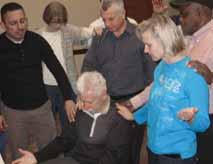

Boschman’s plans are to transition to other ministry opportunities, including some that will allow him and his wife, Carol, to serve together.
The Leadership Board hopes to fill the position by late spring or early summer of 2014. Search committee members include Leadership Board chair Schroeder and board members Marv Schellenberg and David Hardt as well as Larry Nikkel, chair of the USMB Board of Faith and Life. Inquiries, suggestions or resumes may be sent to Schroeder at steve@parkviewmb.com. — USMB press release

Foundation reviews 2012
Currently, 1,530 clients are using MB Foundation (MBF) as a conduit to fulfill their stewardship objectives, says the USMB stewardship agency in their 2012 annual report, released April 29. Investors continued to bring funds to MBF, investing in certificates and allowing these funds to be used to make loans to churches. These resources were used to fund over $8.5 million in new projects in 2012. Over $3 million in charitable giving was facilitated in 2012 with funds disbursed in accordance with the donor’s recommendations: 25 percent to educational institutions, 23 percent to MB conferences and local MB churches, 17 percent to MB Missions, 15 percent to other MB ministries and 20 percent to non-MB charities. To view the complete 2012 Annual Report, visit www.mbfoundation.com/financialprofile.—MBF


FPU, Tabor
hold graduations
Both Fresno Pacific University (FPU) and Tabor College (TC), the Mennonite Brethren-owned schools headquartered in Fresno, Calif., and Hillsboro, Kan., respectively, held spring commencement ceremonies in May. More than 500 graduated from FPU May 4, including 189 traditional undergraduate students, 131 graduate students and 235 bachelor’s degree completion students. Twenty of the graduate students were from Fresno Pacific Biblical Seminary. Stephen Varvis, FPU provost, was the speaker. Tabor held its spring commencement May 18, with 194 degree candidates from the Hillsboro and Wichita, Kan., campuses. Richard Kyle, long-time professor of history and religion, was the speaker. —TC, FPU
Leadership Board members surrounded USMB executive director Ed Boschman for a time of prayer at the fall 2012 board meeting.
CHRISTIAN LEADER
Plant 2013 Midwest supports church planting
A second benefit event this spring raised awareness for USMB activities and netted about $10,000 for church planting. Plant 2013 Midwest was held April 20 at First MB Church, Wichita, Kan. Like Plant 2013 Pacific, held Feb. 23 at Dinuba (Calif.) MB Church, the event featured a dinner and silent and live auctions. About 110 attended the Wichita event.
Some 65 items were sold in the Plant 2013 Midwest silent and live auctions, including weeklong stays at vacation homes; a wheel from Mark Martin’s Daytona 500 car; and a Wichita (Kan.) State University basketball signed by coach Gregg Marshall and the team. Also popular were a number of handmade items, quilts, antiques, Hillsboro sausage and baked goods. Proceeds will go toward church planting projects through Mission USA, the USMB church planting and renewal arm. USMB’s vision is for Mission USA to have an integral part in planting plant six new churches each year for the next 10 years. —USMB
byTheNumbers
Every 15 minutes someone in the United States takes his/her own life.
35,000 suicides occur every year in the U.S.
Every suicide leaves an average of 6 to10survivors.
Christianity Today Library Newsletter, April 11, 2013


5 minutes with...
STEVE HARMS
Pastor Steve Harms has two congregations: the 1,200-member Neighborhood Church in Visalia, Calif., and the 70-some men and women serving in the Visalia Fire Department. Since August 2011, Harms has been volunteer fire department chaplain.
Did you want to be a firefighter when you grew up?


Not really. I did the opposite: I loved watching things burn – almost lit a church on fire by mistake.
Why did you volunteer for chaplain?
To atone for past sins. Actually, the fire chief went to our church. He asked me if I would come and care for the crew, to see them as a second church to pastor.
Firefighters wouldn’t be your typical congregation.
Yeah, one guy told me right off: “I’m an atheist. I don’t need you.” I said, “Hey, that’s totally cool. But don’t run when you see me. Maybe we can be friends.”
Some mes the language is foul but I let them know I don’t want them to change for me. Let’s keep it real.
What has surprised you?
It’s when there’s a tragedy. One me the crew got a call about a mother who had drowned her baby in the bathtub. They called me to talk to the boyfriend. All he wanted to know is, “Am I going to hell?” That was way over the top for me.

What can Christians learn from firefighters?
These guys are brothers and really care for each other. I have no fire experience, but when I put on the uniform the guys welcome me like family. Wouldn’t it be great if Chris ans treated each other with the same love and grace?
Interview by Kathy Heinrichs Wiest
Churches receive grants
Everence distributed $918,317 in Sharing Fund matching grants in 2012 to help people in need with basic living expenses. Of that amount, $37,044 was given through 105 Mennonite Brethren congregations. The Sharing Fund provides money to match what local congregations have donated to help people with basic needs. Churches from 26 denominations participate. Everence is a ministry of Mennonite Church USA and other churches. To learn more, visit www.Everence.com. —Everence

MWC congratulates pope
Following the election of Argentinian Cardinal Jorge Bergoglio as Pope Francis, Mennonite World Conference issued a letter of congratulations and sent two of its leaders to inaugural services in Rome March 19-20. In a March 14 letter to the Pontifical Council for the Promotion of Christian Unity (PCPCU), MWC General Secretary César García wrote: “Without a doubt the ministry of Francis as the first Latin American—and the first Jesuit—Pope will bring new impetus to our relationships.” —MWC
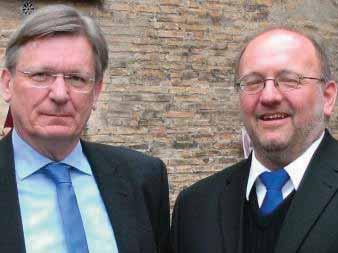
Commentary on John released
Believers Church Bible Commentary: John, the 26th volume in the series, has been released under MennoMedia’s Herald Press imprint. The commentaries are a cooperative project of seven Mennonite denominations, including USMB and the Canadian Conference of MB Churches. The complete set to date can be purchased at www.MennoMedia.org. MennoMedia


Toews authors book
John E. Toews, dean and professor emeritus of Fresno Pacific Biblical Seminary, has authored The Story of Original Sin. This book traces the history of the interpretation of the disobedience of Adam and Eve in Genesis 3 through the biblical period and the church fathers until Augustine. The book is available at www.wipfandstock.com/pickwick_publications .—Pickwick
CL receives awards
The Christian Leader received two awards in the 2013 Evangelical Press Association (EPA) annual contest honoring the best work done by EPA publications during the 2012 calendar year. The magazine received an Award of Merit in the Awards of Excellence, the contest division that is a “best of” award for the 10 EPA membership categories in both print and digital publishing. Roger Wiens’ article, “Why I am a planetary scientist,” published in the Aug/Sept 2012 issue, was awarded fifth place in the General Article: Long category of the Higher Goals Awards The EPA is a professional association of some 300 North American Christian magazines, newsletters, newspapers and content-rich websites.—CL
Historical Commission announces intern
Amanda Bartel is this year’s recipient of the Mennonite Brethren Historical Commission archival internship. Bartel will spend one week at each of the four MB archive centers (Hillsboro, Kan.; Fresno, Calif.; Abbotsford, B.C.; and Winnipeg, Man.) during May and June 2013. She is a student at Bluffton (Ohio) University, a school affiliated with Mennonite Church USA. The internship is made possible in part by support from the Katie Funk Wiebe fund. For more information, visit www.mbhistory.org. —Historical Commission
MWC representatives Henk Stenvers (left) and Rainer Burkart were able to personally greet Pope Francis while in Rome attending the inaugural services.
Support & Space for the
Katja married her high school sweetheart, they had children and they got divorced—all in eight years. She found herself alone with three kids. At times Katja worked two jobs, and even this was barely enough to survive. It was not what she wanted, but she dealt with it. Though it was not easy, her love for her children pressed Katja forward in an attempt to make ends meet.
Single parents like Katja have a tough job. The demands and needs of a single parent are intense. One person is earning a living, paying bills, filing taxes, feeding and clothing their kids, mowing the grass, handing out discipline, trying to socialize, helping with homework, taking care of the house and being a taxi—all pretty much by themselves.
As a youth pastor for 14 years, I have seen the struggles single-parent households experience. It is not easy on the parent or the children. I believe that those of us not in this situation have the resources to help relieve some of the pressure of those whose home has only one parent. When I say resources, I mean time, space and money. When we share our resources, we may change a life or become that key mentor for a student in need of one.
Give your time
Time is one of the resources that single parents do not have enough of. Between work and home life, there is pre-
cious little time. Consider all the things that we two-parent households find hard to do given our busy schedules, then multiply that twice for single-parent households with schedules just as busy.
So what can we do with our resource of time? Consider giving some time to the single parent. Offer to take their child or children for several hours every few weeks to free up the single parent to do something which this parent may not have done in a very long time. Maybe the single parent needs to do some shopping or would like to take in a movie and dinner with a close friend or just wants to rest.
There are many ways that you can allow a single parent a chance to get some things done, knowing that they have placed their child in the care of someone whom they trust. You may be out a few dollars for a trip to Sonic, or possibly go to a movie. The chance to regroup, possibly even renew, for a couple of hours every few weeks may be just what the single parent needs.
Share your space
How about giving the gift of space to the single parent? Though there are many ways that you can give space, I think of opening your home. In a K! Magazine article about a single mom and her kids (March/April 2012), Rob Rienow writes: “She and her children moved in next door


to us. For the next three years, they were a regular part of our family. The door was open. Meals were shared. Tears were shed. House projects were completed. There were many late night sessions of prayer and counseling. This woman and her children didn’t need a class at church. They needed a family to welcome them into their lives. Her boys needed to see and experience a Christian father and husband. Her daughters needed to see and experience a loving marriage.”
Space may be time around your dining room table. Space may be your living room floor where games can be played. Space may be your couch, where a single parent can share his or her fears, joys, failures and victories and know that there is someone that can be trusted enough to share those things with.
Sure, you face the risk that something may be broken or a spill may occur or even uncontrolled laughter could fill the room. The benefits of sharing your space are amazing.
You have the chance to be a positive influence on a student who needs all the positive influences that they can get in their lives. You have the opportunity to pass to another family some of the blessings you have received.
Donate your money
Sharing money is a tough gift to discuss because it has the ability to do more harm than good. But it is a resource that must be considered. While I’m not endorsing an outright gift of cash (though that can be done), I do support financially helping a single parent who is trying make ends meet.

For example, consider giving a movie pass and snack coupon for the parent and child(ren) to have a night out or buying dinner for them and dropping it off at their house. You could pay someone to mow the lawn or shovel the snow. How about buying all the school supplies that are needed at the beginning of the school year or paying for an oil change for the car?
Maybe you have the ability to handle some larger ticket items: buying a week’s worth of groceries, purchasing new tires for the car to enhance the family’s safety, making a car payment or paying rent/mortgage for a month— maybe during December when it frees up some money to buy some gifts.
You may decide that giving a direct cash gift would be the best way to help a single parent family. If you do this, I have one word of caution: You must allow them to use the money as

by TIM CLEVER
they see fit. They know their family the best; they know where the money can be used the most.
If they use the financial gift in a way that you do not totally agree with but you can see that it was a good benefit, then my advice is to remain quiet. It was, after all, a gift. Now if what is purchased is way out of line—say a $200 pair of Jordan’s—then I might say something. It is a tough call, because it was a gift.
Accepting gifts
Not every single-parent household is in need of help. Some are doing very well and the structure of their life is running smoothly. Indeed, some single-parent households are thriving and could teach two-parent households better time management.
While I applaud those single-family households that are doing well, I also applaud those single-parent households that are struggling and will accept help when it is offered. Allow those who have the resources to be of help with that gift of time, space or money. When you, the single parent, are back on your feet and have the ability, you may be able to then help someone else.
I know Katja, the single mom with the three kids introduced to you at the beginning of this article. I called her “Mom.” I was the youngest of the three kids. We didn’t have much, but we made do. I remember she worked a lot to make ends meet. It had to be hard with three growing kids and all the things that go along with being a single parent. She did what she did to make sure that we were healthy, fed and educated.
And I remember a couple of guys who gave me the gift of time with them. While I don’t remember their names, I remember the time they spent with me at sporting events and at Burger King. That was a big deal to a six-year-old.
So to single parents, do not hesitate to accept a gift that someone offers. If time, space or money is offered, accept it. The giver wouldn’t be offering if they couldn’t afford the gift.
And to two-parent households or anyone else with the resources to offer these gifts, I invite you to consider giving time, space or money to a single parent who could benefit from it. Who knows how you might affect the kids you come into contact with. Maybe one will grow up to be a youth pastor.
Tim Clever is the youth pastor at Corn (Okla.) MB Church. This article is adapted from the November 2012 issue of “The Shovel,” Clever’s newsletter for parents based on his 13-plus years of experience working with teens. Contact Clever at clevertim@yahoo.com
TRUSTING GOD in an
There are moments in life where everything changes in an instant. Our family experienced that moment when my husband, Justin, became very sick. And our lives—not to mention my faith—were turned upside down.
Justin was sick—the kind of sick where you start to forget what healthy ever looked like. After my mom and I took shifts one night to make sure he was still breathing, I drove him to the emergency room in an is-this-reallyhappening daze.
After hours of questions and endless tests, doctors determined that Justin first needed fluid drained from around his heart. He would then be admitted into the ICU for further tests and scans. These were not the words we were prepared to hear.
As the heavy ICU security doors clicked behind us, I could sense all this place held. The ICU is a serious place doing a serious business: trying to save your life. You are there because you are very sick or very hurt. We held tight to hope for healing, but how precarious life seemed in that quiet, intense place. Prayers went up like a wildfire.
Days later the doctors explained that Justin had contracted an unknown virus which caused multiple complications, including fluid around his heart. With the fluid drained and with great care, Justin was discharged from the hospital. It seriously felt like a miracle to see him getting better.
by AMY WALKER
Amidst the relief and rejoicing someone said to me, “God is so GOOD!” and I instantly agreed. My husband is going to live, therefore God is good. But as I walked away I thought, “Yes. Yes? He is…isn’t he? Is all this goodness? Is this what God being good looks like?”
I had to sit down to catch my breath. What if Justin had died? What if God’s answer to our pleas and prayers was to take myhusband to heaven? What of God’s goodness then? If Justin had died, wouldn’t God still be good?
I simply could not wrap my mind around this question, and I wasn’t entirely sure I wanted to find out what God was stirring in me. In the midst of it all, I remembered the story of Shadrach, Meshach and Abednego, three teenagers who were to be flung into a blazing furnace if they did not bow down to the king.They trusted God—so much so they were willing to die for him.
In Daniel 3:17-19, the three young men tell the king: “If we are thrown into the blazing furnace, the God we serve is able to deliver us from it, and he will deliver us from your hand, O king. But even if he does not, we want you to know, O king, that we will not serve your gods or worship the image of gold you have set up.”
I sat with this story for a good long while. The phrase “even if he does not” had my troubled heart’s full attention. If Justin had died, would I still have believed in God’s goodness? Would I have been able to trust him?
And what about the unknown and unavoidable heartache that lies ahead? Could I ever surrender myself in a way that echoes the familiar Bible story? Could I ever say: I know God can heal, but even if he does not, I will follow him. I will love him. I will trust him.
The answer was simple: I didn’t know.
Years later, in small, whispered ways, these questions still come to me. Life has not returned back to the normal before Justin was sick. He contin-
ues to struggle with health issues and pain. It grieves my heart to see Justin suffer,and a hidden, terrified part of me wonders if he will ever be painfree. There are specialists who think his continued health issues could have been triggered by the virus Justin contracted years ago. We really just don’t know.
So we continue to search for answers. We continue to pray for healing. And the struggle to trust in God and his goodness in sickness and in health remains.
I’d love to say that through it all I’ve found a simple three-point plan for how to trust God in difficult times. But the unfortunate truth is there is no such easy plan. Moving toward trust, for me, has been a slow and heart-wrenching journey. Trusting God requires a lifetime of small steps: toward embracing the truth that God loves you, toward having faith in his promises and toward clinging to hope in Jesus, our crowning example of trust.
In his book, Ruthless Trust, Brennan Manning writes, “Why waste time beating myself up for something I cannot affect? What does lie within my power is paying attention to the faithfulness of Jesus. That’s what I am asked to do: pay attention to Jesus throughout my journey, remembering his kindnesses.”
When I find myself doubting, paralyzed by fear, I remember Jesus. I remember how thick his presence felt in the ICU. I remember how Jesus came to embrace us and offer words of hope through our pastor, family and friends. I remember that Jesus is familiar with pain and sorrow and that he knows what it is to suffer. Jesus’ sacrifice is the ultimate example of God’s goodness and his love for me, and I hold tight to the cross in the struggle to believe.
I cling to these truths as I see the lines of pain written inside my husband’s eyes. I trust Jesus to lead me to the heart of the Father and to teach me how to trust in him. Perhaps one day this will all be second nature for me. Manning writes about trust being a “conversion that must be renewed daily,” and this sounds about right. These days I try to take most everything one day at a time.My heart
tends to gravitate toward simple prayers such as “give me this day my daily bread” and “please help me in this day to trust you.”
The journey to trust that God is good has also called me to surrender control and to move toward embracing and accepting how little I know. When you are faced with dark times, one thing often becomes painfully apparent: You are so not in control. It is in this terrible, unraveling place, answers once clear become fuzzy, and so much of what you thought was important (and possibly even true) is simply not.
But, in any and every circumstance, God and his mysterious goodness remains. I have to believe God’s goodness remains and is unchanged in life and death, in time and out of time, past, present or future, whether we understand it or do not understand it at all. God is good, whether you believe it or not. Whether I believe it or not. Truly,he and his goodness are beyond my full understanding, and I am trying to embrace that. Some days are better than others.
As desperate as Justin and I are for his complete healing, we can see God’s movement and, dare I say, goodness inthe ways God has opened our eyes to the sufferings of others. In the way words like “hope” and “heaven” mean something different to us now. And how God has slowly and graciously laid bare the places where we have been trying to find life without him.
AsI grow older, I am simply learning to trust one day at a time. God is really good at revealing to me how little I know and how I am in control of even less. There are times this is incredibly frustrating and difficult. And there are other times when I openheartedly embrace those truths, even feel at rest in the midst of them. And then, miraculously, I find I’ve taken another small step toward trusting in my Father and his goodness.
Amy Walker attends Trailhead Church, a USMB congregation in Centennial, Colo., with her family. Her loves are too many to count, but include karoake, sunshine, steaming mugs of coffee and the written word.

If Justin had died, would God still be good?
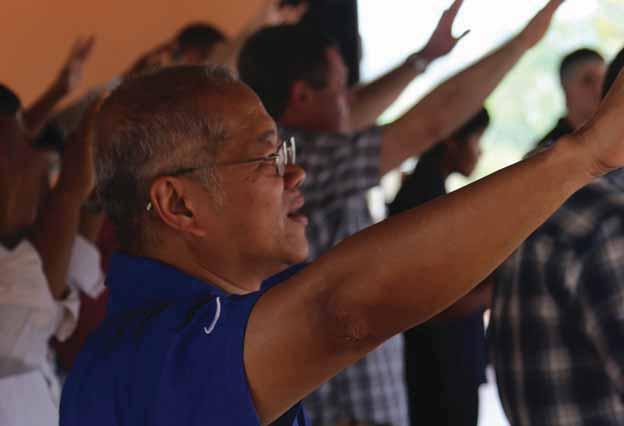
MB Mission recently brought together 20 church planters and mission leaders from North America with 20 church planters from our growing Khmu Mission Conference. We called it a “DNA Exchange Summit,” with the intention of learning from each other what God is teaching us about faith, hope and love. The North American participants slept and ate “Khmu style” at the Changed Life Center in North Thailand.
We were drawn to this summit by the compelling story of a conference of churches that has grown in the past 15 years from several hundred believers to over 40,000. The apostolic role that PK, our MB Mission team leader in this region, has served is one of encourager, counselor and mentor. It is not unusual to hear of whole clans and villages responding to the gospel. Our MB Mission support team is walking alongside PK in leadership training, discipleship and resource support. We continue to ask what we can learn from our Khmu and Thai brothers and sisters and their mission story.
Another pioneering mission story is that of Frank Wiens who sailed for East Asia in 1912 and settled in an unreached city in Fujian province. Frank planted churches and began a pastor training school, clinic and numerous other community development projects. The colonial-style buildings Frank constructed had never been seen in that region be-
fore. One of them is still standing. While most of the buildings and institutions Frank established did not survive the challenges of the past 60 years, the disciples he invested in and the principles he lived not only survived but thrived. He was an MB Mission pioneer whose story is still being told.
Pioneer cross-cultural missions today looks different than it did 100 years ago. We are in the midst of a number of shifts that are changing the way we do mission.
1. From addition to multiplication. While some of our work still involves western Christians living in least-reached communities and planting churches one disciple at a time, we are increasingly focused on discipling indigenous missional leaders who in turn disciple others (2 Tim. 2:2) in church planting movements.
Discipleship multiplication is the focus of these churchplanting movements. MB Mission trained 1,237 leaders in 2012 through ministries like our Changed Life Center in Thailand. In parallel, during the past eight years we have sent over 100 new long-term workers from North America into cross-cultural mission, deploying many of them into equipping and disciple-making assignments.
We’ve refined a central ministry focus for our entire global mission family of “multiplying healthy disciples and missional leaders.” We believe that living this central ministry focus each day is one of the keys to achieving the vision

by RANDY FRIESEN






How MB Mission is adapting its approach to pioneer cross-cultural missions
God has given us of “holistic church planting that transforms communities among the least reached.”
2. From being in charge to equal partnerships. During a recent visit to India, MB Mission staff had the privilege of serving at a number of pastor-focused Bible conferences. We unpacked the themes of faith, hope and love and their practical expression in our lives. During our discussion of love in the way of Jesus, we washed each other’s feet according to Christ’s instruction in John 13. It was a profound moment for all of us. A number of pastors commented afterward that it was their first time to experience foot washing. This simple act symbolized our common humanity as well as Christ’s model of servant leadership.
Power is expressed as sacrificial love when we consider Christ’s example. When sacrificial love is the foundation of our partnerships we will use power to serve rather than control. The International Community of Mennonite Brethren (ICOMB) provides a new context for equal partnerships between MB churches from around the world, including new opportunities to serve together in mission.
3. From owning, to “we own nothing and count nothing as ours” in a coalition of the willing. This openhanded approach to vision, projects and people releases us to explore new partnerships, opportunities and
approaches without considering who gets the credit or the bill. Vision rather than structure or position leads the way.
Our Abundant Life Home HIV orphanage project in Thailand is one of many projects that have brought together business people, medical professionals, construction trades, mission workers and generous donors to reach atrisk kids with the gospel. MB Mission works with many strategic partners around the world every day to live and proclaim the gospel in culturally relevant ways.
4. From global mission to local, national and global mission DNA reproduction. For the past 25 years we have been training youth and young adults in mission discipleship here in North America alongside local church planting opportunities, believing that both local mission and global mission share a common DNA. When Jesus commands us to go, he includes a strategy of “Jerusalem, Judea, Samaria and the ends of the earth.”
The kingdom DNA of sharing and living the good news must be lived out in our own neighborhoods if we are to have an impact on ends of the earth. Similarly, what God is doing in mission in the ends of the earth can strengthen our missional DNA here at home. Our regional and national MB church planting strategies are now working with our global mission strategies in a much more synergistic manner.
Global mission worker internships are occurring in North American church planting settings. North American church planters are learning from church planting movements around the world. Graduate students are learning from church planters in Southeast Asia and North Africa as the world becomes our classroom.
5. From Western mission workers to global mission workers. While mission used to be “from the West to the rest,” it is now “from everywhere to everywhere.” This past year, one-half of the participants in our long-term mission training program were from partner conferences outside of North America. These workers from Latin America, Europe and Asia are joining North American workers in blended teams to plant churches and equip local leaders in least-reached people groups.
Our international partner workers bring spiritual gifts of prayer, contextual sensitivity and perseverance that have blessed our teams. There are significant challenges in bringing different cultures together into ministry teams. However, if we embrace these challenges they will shape and transform us into God’s people.
6. From competition to cooperation. While I still occasionally hear leaders using competition language amongst the various MB ministries on both sides of the border, this “fixed pie” approach to funding and resources is being replaced with a new appreciation for the synergies possible when we work together. The local and global dimensions of mission serve one another if we focus on DNA before strategy.
The formal (degree based), nonformal (seminars and intensives) and informal (mentoring and coaching) expressions of education and training that are available today to leaders are all valuable, especially when they are coordinated and interwoven. Studying, mentoring, coaching, discipling and serving are all essential in preparing and developing missional leaders. Similarly within the global mission arena we are partnering with ministries which specialize in particular areas that we can grow in and benefit from. We desire to serve with open hands, sharing what God has given us.
7. From an emphasis on brand to Christ’s bride. How does MB Mission serve with integrity in our consumer-driven culture of marketing and brand? Jesus calls us to our true identity as disciples of his who are living on a mission together. We are his church, his bride, living for his glory. It is this metanarrative that trumps our individual stories of mission and institutional distinctiveness.
With every Witness we publish or story that is sent out we ask, does this piece give glory to God or are we focusing on the wrong thing? As we consider the in-
creasing variety of expressions of mission in our churches and partnering opportunities on the frontlines we come back to focus on Christ’s bride and her call rather than our brand. This does not negate the importance of clarifying vision, mission, values and strategy as an MB Mission family. However, knowing who we are and what God has called us to should make us better partners who can celebrate God’s larger mission story and all the pieces which contribute to it.
The kingdom DNA of sharing and living the good news must be lived out in our own neighborhoods if we are to have an impact on the ends of the earth.
8. From agency based missions to church/agency synergy. With the increasing interest and engagement in global missions in local churches, in part stimulated by the many exposure opportunities available today, there is a redefinition of the mission agency-church relationship. Some larger churches are hiring mission pastors who have significant budgets at their discretion. This increased ownership in mission vision and strategy on the part of some churches requires that mission agencies function more like consultants than promoters. The challenge lies in avoiding only short-term strategies and outcomes while still encouraging strong local church mission involvement and ownership.
MB Mission has deep roots that provide strength in an era of rapid change. With change comes new opportunities—opportunities to reflect on values, outcomes and God’s invitations to us.
Randy Friesen is MB Mission general director. Friesen wrote this article based on his report to delegates at Conection 2012, the USMB national delegate convention held this past July in Omaha, Neb.
Absolutely changed
“Normal Joes” at The Bridge become men of God
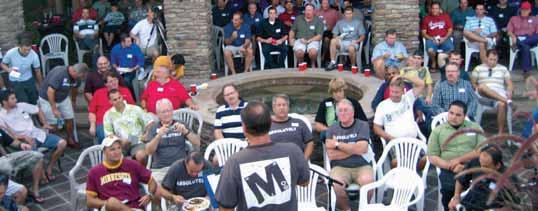
Eric Olinger, Tony Denesha and Ron Froehlich were “normal Joes”—regular guys going about their lives during the week and warming the pews on the weekends at The Bridge Bible Church, Bakersfield, Calif. Unless, of course, a ball game was on or the weather was nice enough for a round of golf.
“If football was on, that was my priority,” says Olinger.
All now claim the title “Man of God” and say their lives have been dramatically changed through men’s ministry at The Bridge.
And they’re not the only ones.
“We’ve seen men come to Jesus in flocks,” says Les Pearsey, men’s ministry director.
As men turn their hearts to Christ, their families, the congregation and the community are being transformed.
Pearsey calls the ministry “the M-stuff,” because as it has developed, each facet has been named with an M: M6, M24, M42 and M72.
It began some five or six years ago when church leaders began to ask what more could be done for men. They decided to ask men— not the typical leaders that might come to mind first—but the “normal Joes” like Olinger, Denesha and Froehlich. So each Bridge leader invited several men to a 24-hour retreat at a local ranch, and every invited man came—a total of 42.
Pearsey, charged with planning the event, asked a friend, Pete McKenzie, to speak. McKenzie, then on staff at an Evangelical Free church in Fullerton, Calif., and now head of Influencers, a ministry to men, simply challenged the retreat attendees to be men of God: “Are you willing to be the man God wants you to be?” Without exception, 42 men stepped forward to answer, “Absolutely.”
Each then invited a few friends to a second 24-hour retreat. Again, each man present stepped up to declare his commitment to living for Christ. Over the course of seven or eight weeks, 112 men made a decision to live differently.
The retreat, now known as M24 (men for 24 hours), has become an annual tradition, with increasing attendance each year. The 2013 M24, held April 26-27, had just fewer than 800 men in attendance.
Each time the message is the same. And each time men respond.
“We serve a big God,” Pearsey says. “God shows up the same way every time.”
M6 and M42 were developed to provide regular discipleship for these men. M6 is a monthly Monday gathering at 6:00 p.m. Some 200-300 men enjoy a meal in the backyard of a home and then hear one man’s testimony.
“It’s amazing to see guys show up and bring new guys to experience the love of Jesus,” says Froehlich.
M42 is a weekly gathering named after those original 42 men. Men gather every Friday at 6:00 a.m. for 42 minutes for small group discipleship. “Journey Groups” use materials offered by Influencers, called “The Journey to the Inner Chamber.” Pearsey says there is usually a line to get in.
While the scope of the M-stuff is impressive, the real story is in the lives changed.
Denesha says his wake-up call came when he found out he was going to be a father.
“I felt this overwhelming feeling that I needed to make some changes in my life so that my son can grow up and be proud of his father as a man of God,” he says.
Through M24 and M42, Denesha says, “I finally gave my life to
The Bridge Some 200 to 300 men gather in a backyard once a month to hear how Jesus has changed one man’s life. It’s just one of the ways The Bridge Bible Church is equipping men.
Christ and decided to fully commit to joining his team.”
He was baptized Dec. 23, 2012—the same day his son was dedicated.
Froehlich and his wife began attending The Bridge in 2010, although not regularly.
“I was pretty good at not getting involved,” he says. “But through the grace of God, that changed.”
Froehlich is now involved in every aspect of M-stuff and says that the relationships he’s made through M42 in particular have “truly saved my life.”
He says, “I have rededicated my life to live for Jesus and to learn what it takes to be the man he wants me to be. And I definitely do need my Journey brothers to keep me on track and growing in the Word.”
Olinger says an M24 retreat three years ago was where his life turned around.
“Jesus grabbed me there, and he entered my life,” he says.
Olinger describes a sunrise gathering at a cross, during which men were invited to leave their “junk” at the cross. He says he kneeled and surrendered his sinful and selfish ways to Christ.
“And he took it. Man, did he take it,” Olinger says. “I walked off that mountain 24 hours later, and I was changed forever.”
When the men experience such change, families are impacted as well. Olinger says his marriage had been rocky at best before that transformational M24, but when he came down that mountain, the change in his life was so evident that other women began to ask his wife about the change. He says his relationships with both his wife
and children have been restored.
“Now my entire family has been completely and radically transformed,” he says.
Froehlich also says his marriage is being restored.
“Once I realized that it’s not about me, but about God, I have had a much better perspective of how I am supposed to be as a husband and the spiritual leader of our home.”
The Bridge as a congregation has been transformed as men step up to lead.
“It’s a men-driven church,” Pearsey says.
Before that first M24 retreat, The Bridge had one paid pastor and 500-600 attendees; now the church has half a dozen paid pastoral staff and some 3,000 attendees. And, notes Pearsey, the growth has come not from church transplants but from changed lives.
The impact ripples out to the local community and even across the border as these men reach out. Once a quarter, Journey Groups cooperate to serve the area’s homeless population in partnership with The Mission at Kern County.
In addition to this local service, Bridge men are serving through M72—yearly 72hour mission trips, often to Mexico, often to build something.
“M72 mission trips to Mexico are unbelievable,” Froehlich says. “We go down to Mexico thinking we are going to bless our Mexican brothers and sisters, but each time we are the ones being blessed. They know what true faith looks like.”
The key to the success of M-stuff is ridiculously simple, says Pearsey:
“Get excited about Jesus and tell someone.”
For more on men’s ministry at The Bridge, visit http://www.thebridgebiblechurch.com/ministries/men. —Myra Holmes

A shot in the arm
SOAR Santa Cruz encourages two California congregations
There are the stereotypes of California’s Bay Area: San Jose ranks among the 10 largest cities in the nation and is in the heart of Silicon Valley, known for affluence, innovation and technology. Just down the road, Santa Cruz—better known as “Surf City”—draws tourists from all over the world to its laid-back, beach lifestyle.
There is another reality: Homelessness, gang violence and addictions are problems in the area. Only a sliver of the population attends church of any kind: an estimated 3 percent in San Jose and 5 percent in Santa Cruz.
“Do the math; it’s a mission field,” says Mark Thompson, short-term mission mobilizer for MB Mission.
And in the midst of this mission field are two USMB congregations: Shorelife Community Church, Capitola, Calif., and Lincoln Glen Church, San Jose, Calif.
MB Mission, the global mission agency of North American Mennonite Brethren, sent a team of about 50 volunteers to work alongside these two congregations through SOAR Santa Cruz, a short-term outreach effort March 22-30.
“We really felt like partnering with our MB churches in Santa Cruz might be a way to provide some lift for them in the areas of evangelism and discipleship,” Thompson says.
SOAR offers 10-day mission experiences that are easily accessible for participants of all ages. With SOAR Santa Cruz, MB Mission expands short-term mission opportunities within the U.S. SOAR Utah will target Salt Lake City July 12-22.
SOAR Santa Cruz participants were together for orientation and debriefing at Shorelife but divided into two teams to serve in San Jose and in Santa Cruz County. The San Jose team, partnering with Lincoln Glen, was comprised primarily of students and adults from New Hope Bible Church, Grants Pass, Ore. The team that partnered with Shorelife was comprised mostly of students and adults from Shafter (Calif.) MB Church. A team of eight college-aged leadership interns provided leadership and organization assistance.
In both locations, SOAR team members aimed to boost the church’s existing outreach efforts. In San Jose, they provided elbow grease for two projects through which Lincoln Glen
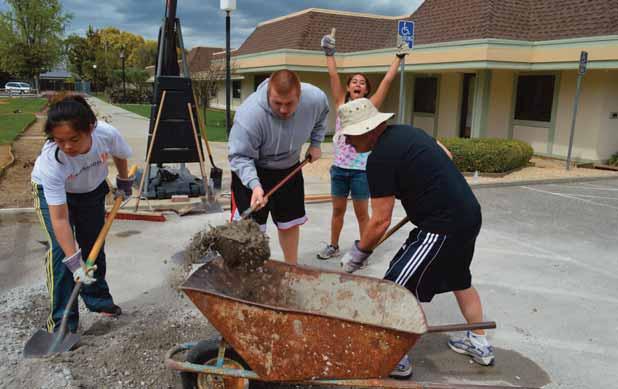
Helping to create a walking track is one way that SOAR Santa Cruz volunteers assisted Lincoln Glen Church.
hopes to serve their community: a new café and performance venue and a walking track that will be the central focus of a par course, meditation trail and picnic area.
The team also canvassed the neighborhood with about 1,500 invitations to Easter services and a community carnival. Lincoln Glen Pastor Bruce Porter estimates that about 200 people from the community attended the carnival, and several showed up on Easter Sunday.
The SOAR volunteers in San Jose ate meals at Lincoln Glen Manor, a senior care facility next to the church, in order to build relationships with the residents. SOAR participants were visibly moved by the loneliness of the seniors, and the seniors seemed encouraged by the energy of the young people.
“We haven’t seen our residents this animated in forever,” Manor employees told Porter.
The Santa Cruz team also provided manual labor for projects on the Shorelife church campus. Pastor Daniel Clubb says that the small congregation sometimes lacks the people resources to complete such projects, so the extra help was encouraging.
They also helped staff a basketball camp for middle school students, prepared and served meals to a homeless community—an ongoing ministry of Shorelife—cleaned at a local elementary school and helped the church prepare for their annual prayer labyrinth and Easter services.
The basketball camp was clearly a highlight. Six participants made a commitment to Christ and were given Bibles. Parents expressed deep gratitude for the love shown their children.
“It was more than a basketball camp,” Thompson says. “I really believe it’s because people were praying.”
In both locations, prayer was key: “We pushed the teams to do a lot of prayer this year,” Thompson says. Teams also spent time daily in Scripture, small groups and journaling.
Both Clubb and Porter say the mission did give their congregations a lift.
“It’s easy to get discouraged in Santa Cruz if you don’t keep your eyes on the Lord, because you don’t see results as fast as you’d like,” says Clubb.
He says the church staff in particular felt truly loved and cared for, and that the energy of the team motivated Shorelife to continue their outreach.
“It does have eternal value,” says Clubb.
Porter says that Lincoln Glen has been targeting four specific groups: the families from the preschool, attendees of the recovery program, seniors at the Manor and those in the neighborhood. The SOAR team helped the congregation build relationships and momentum with all four groups.
In addition, he says, “We’ve made some friends.” Lincoln Glen and the Grants Pass team have a new bond that Porter likens to a “sister church” relationship. He says that some in the congregation are now asking how they can return the blessing and invest in the Grants Pass congregation.
Thompson encourages such cooperation, whether through a SOAR experience or a less formal partnership. He says that it’s easy to think of mission as overseas or to focus narrowly on local community. But he points again to the numbers—5 percent or less attending any kind of church in one of the nation’s largest cities—and says, “Don’t look past some of our great cities. There’s tremendous need.”
He also encourages the larger USMB family to pray for congregations—like Shorelife and Lincoln Glen—faithfully reaching out in those mission fields. That, too, would be a shot in the arm. —Myra Holmes


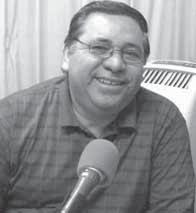

In the restoration business
Eshbaugh works to strengthen CDC churches
When Rick Eshbaugh was growing up in Ulysses, Kan., his father ran an auto body shop where he was introduced to the process of smoothing dings, taking out dents and bringing beauty out of brokenness.
One car in particular stands out: a beaten up 1961 Austin Healey Sprite that was received as payment. The car sat untouched for years, until Eshbaugh took on the project and restored the car to its former beauty so that he could give his aging father a ride in it. Then he sold it. For Eshbaugh, the joy was in the restoration, not in the car.
Now Eshbaugh brings that passion for restoration to his role as district minister for the Central District Conference (CDC). He began Jan. 1, shouldering up to 70 percent of the district minister role while also pastoring the Harvey (ND) MB Church. Former district minister Roger Engbrecht serves part-time as minister to the district’s ethnic congregations.
Eshbaugh has experienced his fair share of personal dents, dings and renovation, and he has a deep desire to see churches restored to full effectiveness, whether that means polishing out minor scratches or overhauling major brokenness.
“What draws me is restoration,” he says. “That’s what drew me to the church and to Christ in the first place— restoration, helping heal those things that are broken. For me, that’s what’s most important.”
Eshbaugh came to Christ during a time of personal crisis in high school, influenced by a teacher who happened to be a Mennonite Brethren. As he grew in his faith, he pursued a call to youth ministry with an education at Sterling (Kan.) College, where he met his wife, Esther.
Their first ministry assignment was with a Presbyterian congregation in Illinois.
“I went there to eat pizza and play with the kids and do ministry,” Eshbaugh says, “but I kind of walked into a buzz saw.”
The church was deeply troubled, and after only a year, the Eshbaughs fled back to Ulysses. The collision had been significant; Eshbaugh was broken.
“I was very disillusioned,” he says.
Remembering that his influential high school teacher, Max Hiebert, attended Ulysses MB Church, Eshbaughs gave the church a try. There, they found restoration. Pastor Jules Glanzer and his wife, Peg, were especially instrumental, Eshbaugh says. Glanzer now serves as president of Tabor College, the MB-owned school in Hillsboro, Kan.
With the full financial and spiritual support of Ulysses MB, Eshbaugh went to seminary at the MB Biblical Seminary in Fresno, Calif., and dared to re-enter ministry.
Over a couple of decades of ministry, Eshbaugh has served congregations in the Southern, Pacific and Central districts, including: Enid (Okla.) MB Church; Fairview MB Church, Topeka, Kan., (now Cornerstone Community Church); Birch Bay Bible Community Church, Blaine, Wash.; North Park Community Church, Eugene, Ore.; and now Harvey (ND) MB Church.

A growing interest in church health led him to work alongside thenSDC district minister Roland Reimer in resourcing pastors and revitalizing congregations using Church Resource Ministries, then to join the CRM staff. A specific interest in helping
Rick and Esther Eshbaugh serve two congregations: the Harvey (ND) MB Church and the Central District Conference pastors.
RICK ESHBAUGH
churches through transition and conflict then led to training in intentional interim ministry.
“I think I’ve seen ministry from about every angle,” Eshbaugh says.
He’s seen churches renewed, and he’s seen churches close. He has worked with a variety of church settings and situations. He has walked with congregations through building projects, relocations and pastoral transitions. And he has worked to mend conflicts rather than just painting over the cracks.
“It seems like I’ve worked with lots of broken churches over the years,” he says— especially through his work with CRM.
But that’s OK with him. “I like things that are broken,” he says, referring again to that Austin Healey. “I’d rather restore something than buy something new.”
Eshbaugh describes the district minister as “pastor to the pastors,” a liaison and a resource for district congregations and a CDC representative at the national level. The role necessarily includes a great deal of travel as he visits pastors and connects with some 26 congregations throughout Minnesota, Montana, Nebraska and the Dakotas.
Since Eshbaugh is also pastoring the Harvey church, he tries to limit Sunday absences. While the dual role will be a balancing act, Eshbaugh says the Harvey congregation “viewed this as a way to serve the district.” The church is looking for an associate pastor both to help shoulder the load and to be trained in a hands-on environment.
Eshbaugh says that, in general, the CDC churches have a passion for the lost and a “tenacious” commitment to expanding the kingdom of God through evangelism, church planting and missions. They have a strong heritage and a firm foundation and understand good stewardship.
And yet, many CDC congregations have taken hits. As demographics and economics shift, especially in rural areas, many are facing change or even fighting for survival.
Eshbaugh dreams that all CDC churches will roar to new life rather than limp down the road. Local congregations, he says, are on the front lines of ministry and have the opportunity to do great things for the kingdom. He dreams of every church emboldened with new vision and empowered to transform their community.
“I have a passion for existing churches,” he says. “How can we help them?”
Restoration could look different for each congregation, he points out. Some may need only a polish; some will need to overhaul how they think about ministry. But when congregations learn how to reach out in unique ways that fit their communities, those communities will know renewal as well.
“I would love to see Christ’s church expanded,” he says. —Myra Holmes

CDC minister Rick Eshbaugh says serving as the Central District Conference minister shares some things in common with restoring this 1961 Austin Healey Sprite.
RICK ESHBAUGH






Don Morris Mission USA director
Planting churches that belong to the family
We’re not planting churches for the already convinced. We’re launching new churches for those who don’t know Jesus yet.
We’re not planting churches to maintain traditional strategies. We’re beginning new churches with strategic missional vision to engage a specific location and culture.
These are huge statements and ones that some of us might even disagree with. We wonder: What’s wrong with the existing churches we have? Why don’t we plant those kinds of churches?
The issue is not that we have to throw the strategies and mind-sets of our existing churches under the bus. We have many really great existing Mennonite Brethren churches. A lot of exceptional churches!
The question is: How will our new churches connect with the cultures they are planted in? With unbelievers in their part of America? How can they effectively “be Jesus” to people and help people come into relationship with Jesus? Specifically, what is God calling us to do in each situation where we are planting a new MB church? What’s his vision? What is peculiar about this city, this neighborhood, this community that calls us to plant (fill in the blank) kind of church and best utilize the planter’s gifts?
These are enormous questions and most cannot be answered by planting churches that look just like our existing MB churches. It just doesn’t work like that.


Stated simply, if we plant churches just like our current churches, many of our church plants will fail. Given our current 80 percent church plant survival rate, we’re well ahead of the 68 percent national church plant survival rate.
I realize numerous genuinely invested people in our existing churches wonder about the above statements, but this is our reality. If we don’t listen to the cultural melodies, we’ll play the wrong church planting instruments and simply put—we’ll fail.
Will you trust those of us involved in church planting in the U.S. to listen to your questions—because we do value your opinions and viewpoints? Will you trust us to also pray a lot, to do due diligence in our analysis, to sufficiently assess our church planters, to favorably invest the money you provide to us and to effectively research the strategies we feel God is calling us to use—all to see as many people as possible come to know Jesus? And of course, we’ll gladly welcome those who are already believers to join and partner in our new missional communities.
We will teach deeply, reach out widely and disciple carefully in our new church plants. Our church plants will be Mennonite Brethren. They may even resemble our existing churches in many ways. But just like your son or daughter, they’ll also look like themselves—somewhat different, but very much a part of the family.







Source: American Bible Society’s State of the Bible 2013 | Barna Group
Congregation in Nevada to join USMB
The Pacific District Conference Board of Home Missions has approved a new project in partnership with Mission USA that has historic implications. The addition of a new Mennonite Brethren church in Las Vegas, Nev., means a Mennonite Brethren church will now be in a sixth western state.
For many months, PDC Minister Gary Wall and Mission USA director Don Morris have been in conversation with an existing congregation in Las Vegas.
“Together we have pondered what a partnership in an outreach-focused re-launch might look like,” says Wall. Both the Pacific District and USMB leadership have carefully discerned the appropriateness of such a partnership and have unanimously affirmed this new work.
The current congregation of 40-plus members has a significant Filipino-American makeup. The primary mission focus will be the 86,000 Filipinos living in Clark County, Nev., although not exclusively so.
“Certainly Las Vegas is an area in great need of the transforming power of Jesus Christ,” says Morris. “Mennonite
Brethren leaders have been praying for many years about this need and the church planting possibilities in this city.”
Morris says, “Those who make up the core of this ‘relaunch’ are wonderful, caring and kind people. They also have a deep passion for reaching their community with the gospel.”
Wall adds, “We believe God has indeed opened this door for our first missionary engagement in Nevada. Please pray for this new ministry as plans are developed in the coming months.”—Mission USA
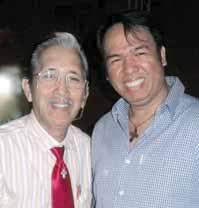
Leadership training event held in Texas
More than 40 people attended a LEAD ONE leadership training event facilitated by USMB and held April 6 in McAllen, Texas. The event focused on church leadership issues such as good leadership communication; why churches do what they do: that “why” we care and serve is the key message we give to those searching for Jesus; why creating a culture of accurate church-awareness and effectiveness through consistent evaluation is crucial for successful impact; the importance of a balanced family life; and the consequences of attempting to lead when one’s own emotional tank is empty.
Seminar presenters from the Latin America MB Conference were Mission MB Church Pastor Rafael Nunez, Grace Point Pastor Aaron Hernandez and his wife, Alejandra Hernandez. Other presenters included John Langer, a businessman from Grace Bible Church in Gettysburg, SD, who has strong personal ties to the region and USMB staff members J Epp, director of development, and Don Morris, Mission USA director.
“The attendees remained enthusiastic and engaged throughout the day,” says Morris. “LEAD ONE is a high-impact oneday event designed to add tools to a church leader’s ministry tool chest. The idea is that we keep returning to each region with LEAD ONE events providing new leadership tools each time,” he says.
“We’ve had three LEAD ONE events cancelled over the past couple of months due to snow and ice—two in the Southern District and one in the Central District. I was thankful to hold one in a
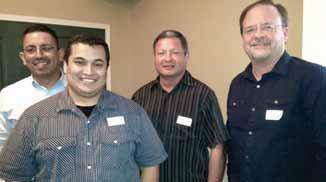
location where the temperature was already 80 degrees in early April,” Morris adds.
The LEAD ONE event was held at the Holiday Inn Express in McAllen where Hernandez is leading a new Mission USA-sponsored church plant, Grace Point @ McAllen.—Mission USA
Pastor Andy Basilio (left) and Associate Pastor Aris Tolentino are leading the congregation in Las Vegas that is joining the USMB family of churches.
Ozzy de la Cruz, forefront, provided the technical expertise at the recent LEAD ONE seminar in McAllen, Texas. Presenters included Aaron Hernandez (back left), Don Morris and J Epp.
Andy Basilio

Talking finances without the fight
Finances. It has the power to create stress and division in any relationship. Discussing the monthly budget can result in tension even in the best, most stable marriage.
The Huffington Post conducted a study of 1,000 married couples to explore what couples fight about the most. The results showed that 27 percent of arguments in these marriages stemmed from finances. More than in-laws, children, housing, chores, work, etc., finances ranked highest out of every topic in the entire study. But there is hope. Having a financial discussion with your spouse does not have to result in frustration. There are some key aspects that, if recognized, can actually change this very tense subject into a positive communication experience that can even give way to dreaming and planning together for your family’s future.
over their heads at night. Women are not as likely to be concerned with saving for a certain purpose. Instead, they are interested in saving money for assurance purposes. The peace of mind that comes from having a buffer to fall back on in life is extremely important to women. Women typically cringe at the thought of watching the money they worked hard to save leave the bank account, even when it leaves for the purpose it was saved for.
Arguments surrounding finances are, many times, a result of two people speaking different languages about the same thing. When a couple can recognize this and learn to respect their spouse’s point of view, they can begin to find a middle ground between differing priorities and perspectives. When a husband recognizes that a sense of security is important to his wife, he can begin to look at finances through a perspective of providing that security. Similarly, when a woman can see that taking a risk is important to her husband, she can start looking at finances through his perspective and have some fun with it.
Finding this middle ground allows a couple to enter into the conversation of finances from a place of agreement and mutual respect. This lets a couple address finances without tension and argument. It does not mean you won’t disagree with your spouse. But it does mean that you will respect your spouse’s position when you disagree. And more times than not, this is more important than agreeing.

To navigate this topic with ease, obstacles need to be recognized and addressed. The biggest one is that men and women view finances differently. When talking with couples in pre-marital counseling or marriage mentoring, I have the couples individually fill out a questionnaire regarding their views on money. The results are almost always the same. Men typically view money as a way to provide and entertain. Things like saving or planning don’t fall into their natural rhythm unless there is a specific purpose attached. Men are typically excited to save when the result is a new car or house or whatever the item may be. Men are more inclined to plan and budget when there is a goal in mind. They want something to show for their saving efforts. Women are on the other end of the spectrum. They typically view money as a source of safety and security. They want to know there is enough money to pay all the bills, provide food and have a roof
Doug Milem is a certified life coach and marriage mentor who lives in Phoenix, Ariz., where he is part of Axiom Church, a USMB church plant in Glendale, Ariz. He and his wife, Megan, have been married for five years and are in the process of adopting their first child.


Carmen Andres
Valuable viewing
The Barna Group conducted an online survey last year about people’s movie-watching habits and attitudes. They found the average American saw 1.7 movies in the theater, 10 more on DVD or streaming and still more on cable. Evangelicals saw 2.7 movies at the theater—more than the average.
But most interesting to me was this: Only 11 percent of respondents said “they saw a movie in the past year that made them think more seriously about religion, spirituality or faith.”
Really? With Pew Research indicating 73 percent of Americans identify as Christian, I think this response may have more to do with how we approach films than the films themselves.
Maybe we don’t feel spiritually challenged by films because our culture encourages us to compartmentalize— put our faith in one box and our movie watching in another. Or perhaps we think of the culture around us as secular or absent of God and include movies in that.
But if we pay attention, movies can tell us about ourselves, the world and our own story. In an interview with Christianity Today, film critic Jeffrey Overstreet reflects, “A good movie is truthful—whether the subject is something beautiful or something terrible, whether it’s an inspiring story of a virtuous hero or a troubling story about bad choices and painful consequences.”
Movies have the capacity to reflect something of the truest and best story, the one in which we all live and breathe. Movies can reflect God’s truth and help us understand it in our lives today.
“I visualize an arch with one end anchored in the ancient world and the other in a contemporary cultural situation,” writes Robert Jewett in Saint Paul at the Movies. He looks for “parallel stories” in film that resonate with the stories in Scripture: “I look for the spark

that flies between the two arches of the biblical text and the contemporary film.”
What we find, says Jewett, will help us understand biblical truth and “throw light on contemporary situations.”
How can we be more open to encountering those sparks?
First, we need to start thinking about movies as stories with the capacity to, as Jewett puts it, “disclose truth in their own right.” How does that truth help us better understand ourselves, the world and our own story?
We shouldn’t be quick to dismiss genres that don’t seem valuable. The Barna survey notes the most-attended films among evangelicals were The Avengers (42 percent) and The Hunger Games (36 percent). Both stories have elements that bring God-talk into open spaces.
Don’t stay away from a film just because it is dark or has suffering. There is value in these stories. “In depicting darkness, art…can also serve as a vivid reminder of the world that ought to be,” says Brett McCracken in Relevant magazine. “(T)he redemption journey moves through all manner of blood-curdling atrocities and skintingling horrors along the way—and the gospel is all the more beautiful because of it.”
That doesn’t mean every story is worth viewing. “Each person needs to know their conscience and their weaknesses,” Overstreet says. “That means we need to do more than check the film’s rating.”
Read about the films you see. Some critics’ reviews are informed by their faith. Talk with others about the stories and the issues they raise. If the films we watched last year didn’t make us think more seriously about our faith, perhaps we didn’t choose wisely or didn’t watch well.
Carmen Andres is a freelance writer and former CL editor who lives in Alexandria, Va. She blogs at www.intheopen.blogspot.com. This article is reprinted from Mennonite Weekly Review.

Those interested in what Mennonites are talking about right now will enjoy MennoNerds, a network of well over a dozen bloggers from a wide variety of backgrounds and Anabaptist-related denominations. Topics range from weighty theological questions and interesting movies to parenting and applying Scripture to everyday life. One MennoNerd blogger recently posted on Twitter: “One thing to note about the MennoNerds… We don’t always agree on every detail, but we agree on that which is vital: the gospel of Jesus.” USMB pastor Justin Hiebert is among the bloggers included. Subscribe to updates at http://mennonerds.com/ or follow the dialogue on Twitter using the hashtag #MennoNerds.


BAPTISM/MEMBERSHIP
John and Sandra Wright were received as members of Community Bible Church, Olathe, Kan., April 14.
Hayley Mozingo and Sarah Sperling were baptized May 5 and received as members of Shafter (Calif.) MB Church. Susan Arnold was received as a member.
Grace Goertzen, Jake Goertzen, Jordan Rodgers-Greene, Albert Mendoza and Myrna Oken were baptized March 31 at Reedley (Calif.) MB Church and received as members April 7. Dirk and Jeannette Byle, Chester and Betsy Funk, Allen and Laurel Jackson, Elizabeth Mendoza, Kaylee Merritt and Wayne and Sandy Skaret were also received as members. Johnny and Maxine Heinrichs, Sandy Jordan and Cassie Unruh were received as members April 21.
Teagan Becker, Justin Dueck, Christian Farley, Alyssa McNeely, Michael Neufeld, Tom and Sandy Odam, Allison Quinn, Alyssa Quinn, Aaron Ray and Rebecca Richey were baptized March 31 at North Fresno (Calif.) MB Church and received as members April 7. Brett and Sue Kincaid, Jonathan Niccolls, and Norm and Lollie Willems were received as members.
Derek Barcelon was baptized March 31 and received as a member of Garden Park Church, Denver, Colo.
Heather Bittner, Trevon Martens, Dakota Wilson and Cheyenne Wilson were baptized March 24 at Christ Community Church, Sioux Falls, SD. Anthony and Heather Shaheen were received as members April 14.
Jake Neufeld and Beth Simmons were baptized and received April 7 as members of College Community Church, Clovis, Calif. Joshua Simmons was also received as a member.
Larry and Kathy Duerksen were received as members of Buhler (Kan.) MB Church March 3.
Brittany St. Clair was baptized March 3 at Laurelglen Bible Church, Bakersfield, Calif.
Kirstyn Prado, Connie Williams and Dan Williams were baptized March 31 and received as members of Kingsburg (Calif.) MB Church.
Brenda Bravo, Linda Springs and Nancy Suderman were received as members.
Matthew Kronyack, Sergio Estrada, Joaquin Deleon and Rosa Elena Madrigal, Ebey Houengpaseuth and Matthey Myrassamy were baptized March 24 at Butler MB Church, Fresno, Calif.
Ashley Nikkel was baptized March 31 at Trailhead Church, Centennial, Colo.
Loyd Ratzlaff was received as a member of Zoar MB Church, Inman, Kan., March 24.
Eighteen people were baptized March 3 at South Mountain Community Church, Draper, Utah: Richard Walus, Chad Walsh, Mike Allegrini, Patricia Hard, Max Morgan, Lexee Smith, Grace Altman, Gage Saunders, Andrea Peterson, Lyndsey Willnow, Amanda Clark, Jared Gibb, Janica Hayes, Madison Bell, Tommy Bronkowski, Cortez Gee, Patrice Powell and Melissa Finsand. Brenda Murray and J. Lynne Sharp were baptized March 10 at the Daybreak campus.
WORKERS
Blake Beye is serving as a summer worship intern at Bible Fellowship Church, Minot, ND.
Sarah Carter has been hired as the new director of children’s ministries at Heritage Bible Church, Bakersfield, Calif.
Roy Keller, visitation pastor at Parkview MB Church, Hillsboro, Kan., has retired.
Scott Holman, pastor at Butler MB Church, Fresno, Calif., is on sabbatical June 16-Aug. 9.
Chris Lord is the new part-time pastor of music and worship at Belleview Community Church, Littleton, Colo
Ray O’Neil has announced his retirement from the pastoral staff of Reedley (Calif.) MB Church, effective July 1.
DEATHS
Bergman, Leland “Lee” Wallace, Shafter, Calif., member of Shafter MB Church, May 27, 1916—April 17, 2013. Parents: Henry and Mary (Pankratz) Bergman. Spouse: Alvina Hilderbrand, deceased; Norma Plett, deceased. Children: Kathy Handel; stepchildren: Dee, Michael, Lynn; 14 grandchildren; 26 greatgrandchildren.
Buhrkuhl, Mathilda Janzen, Stockton, Calif., member of Quail Lakes Baptist Church, Stockton, Jan. 10,1933—Nov. 17, 2012. Parents: John and Gertrude Warkentin. Spouse: Melvin Buhrkuhl. Children: Bev Hathorn, Tim, Laura Stone; 10 grandchildren.
Dahl, Irma Mary, Hillsboro, Kan., of Hillsboro MB Church, July 28, 1910—Feb. 13, 2013. Parents: John P. and Maria (Unrau) Franz. Spouse: Abe B. Dahl. Children: Frances Unruh, Lillian Falls, Dorothy, Sharon Schroeder, Beverly Boese, Barbara Braun, Donald; 13 grandchildren; 23 great-grandchildren.

Waldo Hiebert dies
Waldo Hiebert, who died in February at the age of 98, will be remembered as a pastor, a church statesman, an influential educator and a devout Jesus follower. Hiebert served as a professor and as dean of students at MB Biblical Seminary (MBBS), Fresno, Calif., teaching for more than a quarter of a century before retiring in 1987. He also served on various Mennonite Brethren district, national and binational committees: chair of the Board of General Welfare and Public Relations (1957-66); chair of the Board of Missions/Services (1966-75); seven years as chair and vice chair of U.S. Reference and Counsel; and 29 years as an officer and member of Southern District Conference and Pacific District Conference committees. As pastor of two large churches—in Hillsboro, Kan., (10 years) and in Reedley, Calif., (six years)—he endeared himself to many. “Of all the things that Waldo meant to the people in the church that he served, what stands out is his personal connection with them, his pastoral presence, his human warmth,” said Hiebert’s son, Ted, in his eulogy at the memorial service. Hiebert was born July 3, 1914, at Mountain Lake, Minn., and died Feb. 25, 2013, in Fresno. On June 6, 1944, he was married to Rachel Wiebe, who predeceased him. He is survived by his children, Ted, James, Susan Bercilla and Daniel.

Youth serve
Youth from several Central Valley congregations joined to serve three California communities over spring break March 23-27. The effort grew out of ongoing conversations between youth pastors from seven Pacific District Conference (PDC) congregations: North Fresno (Calif.) Church; Mountain View Community Church, Fresno, Calif.; Bethany MB Church, Fresno; College Community Church MB, Clovis, Calif.; Reedley (Calif.) MB Church; Dinuba (Calif.) MB Church; and Kingsburg (Calif.) MB Church. The youth gathered on March 23 for training, then established a base camp March 24-27 on private property near Mendota, Calif. From there, teams served smaller, rural congregations in Tranquility, Mendota and San Joaquin. They helped with a basketball camp and a community carnival, ran a children’s Bible camp, connected with area teens and helped with projects around the church facilities. Matt Ford, youth pastor at North Fresno, says the project “was a great picture of unity in our denomination. Our youth are leading the way in saying we’re part of a bigger story and we’re joining together to do what really matters.” The service opportunity builds on a one-day, regional youth conference that took place in November 2012 at College Community Church MB, Clovis, Calif.

Dyck, Katherine Marie, Corn, Okla., of Corn MB Church, Aug. 12, 1927—April 1, 2013. Parents: John and Sarah (Penner) Nusz. Spouse: Arthur Dyck, deceased. Children: Kenneth, Howard, Barbara; 10 grandchildren; four greatgrandchildren.
Ediger, Lois, Hillsboro, Kan., of Hillsboro MB Church, Oct. 17, 1926—Feb. 9, 2013. Parents: Heinrich J. and Elizabeth (Klaassen) Voth. Spouse: Joel H. Ediger, deceased. Children: Larry, Gerald, Lyle, Allen; 10 grandchildren; seven great-grandchildren.
Ewert, Lena, Mountain Lake, Minn., member of Community Bible Church, Mountain Lake, June 14, 1923—Feb. 14, 2013. Parents: David H. and Agatha (Baerg) Ewert.
Harms, Andy J., Moundridge, Kan., of Hesston (Kan.) MB Church, July 21, 1923—March 18, 2013. Parents: Henry R. and Margaret (Thiessen) Harms. Spouse: Lillian Just. Children: Roger, Larry, James, Margaret Knoll; seven grandchildren; two great-grandchildren.
Krause, Frances, Bakersfield, Calif., of Rosedale Bible Church, Bakersfield, June 10, 1923—March 20, 2013. Parents: Peter and Susie Kopper. Spouse, James Krause, deceased. Children: Dennis, Darrell, Don, Dan, Denise Guthrie; 13 grandchildren; 22 great-grandchildren. Leppke, Margie Reimer, Reedley, Calif., of Reedley MB Church, Aug. 10, 1925—April 8, 2013. Parents: Abraham and Margaret (Kroeker) Reimer. Spouse: Harold Leppke, deceased. Children: Sharon Jones, Timothy, Susan Ekberg, Jonathan; 11 grandchildren; 13 great-grandchildren.
Loewen, Esther Eleanor, Reedley, Calif., of Reedley MB Church, Feb. 20, 1924—April 6, 2013. Parents: Jacob and Maria (Bueckert) Hiebert. Spouse: Wallace Loewen. Children: John, Judi Emerson, Connie Jost, Jacquie Pronovost; 10 grandchildren; 10 great-grandchildren.
Pauls, Gerhard “Gary”, Dallas, Ore., member of the former Dallas MB Church, Feb. 9, 1923— March 18, 2013. Parents: Jacob D. and Anna (Funk) Pauls. Spouses: Matilda “Tillie” Kliewer, deceased; Gladys Fast Epp. Children: Joanne, Robert, James, Jeanne Trapani, Suzi Silveira; four grandchildren; five great-grandchildren. Reed, Jerry, Reedley, Calif., of Reedley MB Church, July 27, 1943—April 17, 2013. Parents: James Reed and Evelyn Hagopian. Spouse: Lou Ann. Children: Jeryll Ann, Lorin; three grandchildren.
Reimer, Aldean, Bakersfield, Calif., of Rosedale Bible Church, Rosedale, June 8, 1928—Jan. 20, 2013. Parents: Sam and Dora
Unruh. Children: Kevin, Claudia Moore; six grandchildren.
Reimer, Sussie Mable, Ferndale, Wash., member of Birch Bay Bible Community Church, Blaine, Wash., Dec. 13, 1925—Feb. 25, 2013. Parents: Gearhardt and Tiena (Quiring) Dyck. Spouse: Abe Reimer, deceased. Children: Eileen, Charlotte, Robert, Debbie, Delores, Peggy; 10 grandchildren; 15 great-grandchildren.
Schroeder, Ruby K., Hillsboro, Kan., member of Hillsboro MB Church, Aug. 21, 1927—April 3, 2013. Parents: John and Katherine Prieb. Spouse: Ken Schroeder. Children: Kathy Schmidt, Vincent, Russell; seven grandchildren; 16 great-grandchildren.
Winter, Dale, Hillsboro, Kan., member of Parkview MB Church, Hillsboro, July 4, 1957— April 25, 2013. Parents, Floyd and Lillian (Ediger) Winter. Spouse: Rachel Hofer. Children: Erin.
reaching in DISCIPLESHIP
College-aged adults from several Fresno, Calif., area churches—including College Community Church MB, Bethany MB Church and North Fresno MB Church—partnered to begin a new ministry to college-age adults in April.
Grace Community Church, Sanger, Calif., joined with Riverpark Church in Fresno to host Kingdom Rock, a special vacation Bible school during Easter week. They had an average nightly attendance of 80 kids, and eight children asked Jesus to come into their lives.
Young adults from Heritage Bible Church, Bakersfield, Calif., meet at a local Starbucks on Tuesdays for a Bible study.
Reedley (Calif.) MB Church encouraged attendees to use “The Bible” series on The History Channel as a catalyst for outreach by inviting friends and neighbors to watch it at the church or hosting a “viewing party” at their home. A Sunday sermon series and Wednesday evening study in March also connected to the TV series.
FELLOWSHIP
Women from Trailhead Church, Centennial, Colo., attended their first annual retreat April 19-21.
The Amor y Fe congregation of Butler MB Church, Fresno, Calif., hosted a dinner May 11 to honor mothers.
Mentors and teens from College Community Church MB, Clovis, Calif., went to the zoo together April 27.
Iglesia Compañerismo Cristiano, Shafter, Calif., celebrated Easter with a church potluck and Easter egg hunt for the kids.
Neighborhood Church, Visalia, Calif., organized separate mother/son and father/daughter dinners at local restaurants April 28.
Grace Community Church, Sanger, Calif., has a coed softball team—the only church team in the all-city league.
Attendees of Bible Fellowship Church, Minot, ND, went bowling and ate pizza March 10.
Deacons from Reedley (Calif.) MB Church hosted an appreciation dinner for seniors in the church March 3.
Youth from Koerner Heights MB Church, Newton, Kan., participated with other youth groups in a community-wide dodgeball tournament March 10. A break between games featured concessions and a Christian message.
High school youth from Bible Fellowship Church, Rapid City, SD, meet for a meal each Sunday evening to help each other with homework while growing their relationships.
Women from Shadow Lake Community Church, Papillion, Neb., organized a kids’ clothing swap April 5.
Green pancakes were on the menu when The Heart Church, Tulsa, Okla., hosted a St. Patrick’s Day breakfast March 17.
WORSHIP
The Dinuba (Calif.) MB Church choir presented “Sovereign Lord” on Easter Sunday.
The choir at North Fresno (Calif.) MB Church presented the Easter musical “It is Finished” March 31.
A representative from Jews for Jesus presented “Christ in the Passover” at Bethesda MB Church, Huron, SD, March 17.
Shorelife Community Church, Capitola, Calif., offered a prayer labyrinth for worship and reflection on Good Friday.
Discovery Bible Fellowship, Collinsville, Okla., organized family photos of those who attended on Easter Sunday.
Vinewood Community Church, Lodi, Calif., invited attendees to read, reflect and pray through the Stations of the Cross, set up in the church fellowship hall March 25-29.
LOCALLY
A group from Birch Bay Bible Community Church, Blaine, Wash., served in downtown Vancouver, BC, May 16-19.
Watershed Church, Kansas City, Mo., served their local elementary school April 28 by helping with a BBQ at a local park.
Iglesia Compañerismo Cristiano, Shafter, Calif., has started a community garden on the church property with the help of Shafter (Calif.) MB Church families, local farmers and a local gardening company. Church youth spent a recent Saturday morning planting vegetables and flowers. The harvest will be shared with families in the community.
College Community Church MB, Clovis, Calif., recently held a rummage sale to raise money for Mennonite Central Committee’s work with Syrian refugees in Syria, Jordan and Lebanon. The junior high sold coffee, cookies and a hot dog/hamburger lunch. Area Mennonite Brethren and Mennonite churches donated used goods for the sale. The total raised, including an offering after the sale, was $1,481.21.
CLEARINGHOUSE
Worship Minister: Shorelife Community Church, a small MB church in Capitola, Calif., is searching for a person with God’s heart for worship to lead our community of believers in worship during weekly corporate worship gatherings. This paid, part-time position is available to be filled immediately. Salary will be commensurate with agreed upon job time requirements and responsibilities. A complete job description is available upon request. To apply send a resume and a DVD/CD or Youtube link of the candidate leading worship to: Shorelife Community Church, 875 Monterey Avenue, Capitola, CA, 95010 or email at: daniel@shorelifecc.org.
Lead Pastor: Henderson (Neb) MB Church is a congregation of 107 members in a small rural community looking for a pastor with leadership skills and strong values of prayer, personal integrity and professional growth. We desire a man who can relate well with young adults and families, has a relevant preaching style and heart for evangelism and outreach. For further information: email mbchurch@mainstaycomm.net or visit our website hendersonmbchurch.com.
Visitation Pastor: Parkview Church in Hillsboro, Kan., is seeking a quarter-time visitation pastor for the elderly.
Inquiries or resumes should be sent to: Parkview Church, 610 S. Main Street, Hillsboro KS 67063 or emailed to: steve@parkviewmb.com.
Lead Pastor: Bethany MB Church in Fresno, Calif., is seeking a qualified individual to serve as a lead pastor to a multigenerational congregation of approximately 225. This pastor will be asked to provide strong biblical teaching, lead a staff of three associate pastors and assist the church body in their desire “to love, to belong, to respond.” Bethany is located in a newer area of northeast Fresno. Seminary graduation is required. Previous pastoral experience is preferred. Please send resumes to Jay Wiebe, Bethany MB Church, 9161 N. Maple, Fresno CA 93720 or to jawiebe5@msn.com.
Youth Pastor: Garden Valley Church, a Mennonite Brethren congregation in Garden City Kansas is accepting applications for a full-time youth pastor. Garden Valley is a family oriented church with an active youth ministry. Salary commensurate with education and experience. To apply please send resume to:GVC Youth Pastor Search Committee,1701 N. 3rd Street,Garden City, Kansas 67846or e-mail at: gvchurch@gmail.com.
Pine Acres Church, Weatherford, Okla., presented the original Easter pageant “Papa’s Hands” March 28-31.
Corn (Okla.) MB Church now delivers Wednesday evening meals to those who are housebound or otherwise unable to attend the church’s regular midweek activities.
Men from The Bridge Bible Church, Bakersfield, Calif., organized a shoe drive March 15 to benefit the local rescue mission.
GLOBALLY
A team of eight men from North Oak Community Church, Hays, Kan., built a house in Dominican Republic April 7-14. The trip was funded by gifts from the church’s participation in Advent Conspiracy.
High school youth from Pine Acres Church, Weatherford, Okla., will go to Denver, Colo., July 14-20 to partner for the third time with a local church to serve in lower-income housing complexes.
A team from Heritage Bible Church, Bakersfield, Calif., will serve in Thailand June 15-July 2.
A team of 54 students and adults from Laurelglen Bible Church, Bakersfield, Calif., built three houses and ran a vacation Bible school in Tecate, Mexico, March 22-27. The church was recognized by the local ministry, Amor Ministries, for 18 years of sending teams and honored as a model church team.
Middle school students from Bible Fellowship Church, Rapid City, SD, will partner with a church from Chicago, Ill., for a mission trip June 20-28. The team will serve in Rapid City and on the Pine Ridge Reservation. Adults from Bible Fellowship are also invited to serve during the Pine Ridge portion of the trip.
Pastor of Care Ministries: The Shafter (Calif.) MB Church is seeking a part-time pastor of care ministries. For additional information please contact Pat Coyle, Senior Pastor (pcoyle@shaftermb.org).
Senior Pastor: Grace Bible Church, Gettysburg, SD, is searching for a full-time pastor with leadership qualities, who can relate well with young married/single adults. Our evangelical church is very social and out-going with approximately 110 members. Send resumes and inquiries to Ray VanBockel c/o Grace Bible Church, 310 South Broadway, Gettysburg, SD 57442.
Lead Pastor: Waterloo MB Church is a church in mission: a people sent by God to live incarnationally for Jesus in every area of our lives and a church called to be an integral component of our broader community. Located in Waterloo, Ontario, we are looking for a Lead Pastor who is a strategic and forward thinker, a developer and multiplier of leaders, and an effective communicator. To learn more about Waterloo MB Church and this opportunity, visit www.waterloomb.org/employment.
















